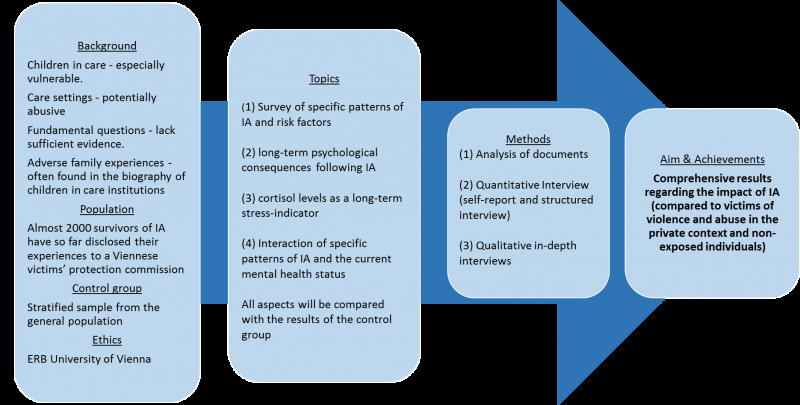Institutional abuse and its long-term consequences

Funded by the Austrian Science Fund FWF, the "Vienna Institutional Abuse Study" is the first to investigate the psychological long-term consequences of institutional abuse and violence. Based on data provided by the City of Vienna, psychologists work with adults having experienced childhood institutional abuse to explore the unresolved issues of a dark chapter in institutional history.
In the context of their private lives alone, about 20 percent of the population are subject to abuse and violence during their childhood. The percentage of victims of physical, sexual and emotional violence is particularly high, however, among children who grow up outside a family context, for instance in welfare institutions. In recent years, numerous scandals all over Europe have brought to light a shocking level of child abuse in childcare institutions. Austria is no exception, and only in recent years has the general public become aware of the level of violence to which children in Vienna's municipal welfare institutions were exposed until well into the 1980s. Researchers from the University of Vienna are currently addressing this situation in a major investigation that seeks to provide empirical evidence of what has been dealt with theoretically for the most part so far – namely, the question as to the particular dynamics of institutional abuse and its long-term consequences for those affected. "Empirical evidence for fundamental issues in this field of research is still missing, although foster children and children in institutional care are considered particularly vulnerable to phenomena of abuse", says Brigitte Lueger-Schuster, the clinical psychologist who heads the three-year FWF research project which started in 2014.
First comparative analyses
For the first time, the City of Vienna has authorised the Vienna-based researchers to access about 2,000 dossiers and establish contact with affected individuals who received damage awards for the abuse suffered in Viennese welfare institutions. Since 2010, victims of abuse have been able to claim damages before a commission dedicated to the protection of victims, the "Wiener Opferschutzkommission", which still receives several dozen new applications every week. The study itself also triggered numerous reactions from victims of abuse, noted Lueger-Schuster, who assumes that the number of unreported cases is extremely high.

For the first time, comprehensive data are being collected in this way by the researchers in the context of the FWF research project. Under the title of "Vienna Institutional Abuse Study" it focuses on two key areas. First, the study compares the experiences of individuals affected by institutional abuse to the average population and victims of abuse in a private context. To this end, the scientists analyse and assess specific aspects, such as family-related risk factors, the level of violence encountered in the institutions, as well as factors that may help predict certain types of abuse.
Psychotraumatology and diagnostics
Secondly, the long-term impact of institutional abuse is examined on the basis of international systems of diagnosis and classification: mental disorders, particularly post-traumatic stress disorders, cortisol levels in hair as an indicator of long-term stress and social aspects such as disruptions in personal histories are taken into account. "Currently there is a huge debate in psychotraumatology about complex post-traumatic stress disorders", explains Lueger-Schuster. "The project enables us to challenge current WHO-based diagnostic systems and look at the problem from a wider perspective by investigating what violence and abuse may mean, for instance, for the development of aggressive behaviour, the sense of self-worth, the sense of control or the way someone deals with failure. In this way we can offer major input for the discipline of psychotraumatology."
Biographies Of Abuse
Existing studies show that 50 to 60 percent of individuals who lived through traumatising experiences in childhood will still suffer from massive mental stress disorders in adulthood. "This is why it is tremendously important to understand and systematically describe these long-term consequences; there are an excessive number of people affected and we have reason to fear that there will be victims in the future", emphasises the psychologist. So far, the team around Lueger-Schuster has conducted interviews with 144 survivors of childhood abuse. More than 50 percent are men with an average age of 58. About 20 percent spent many years of their childhood in a home, 85 percent were taken into institutional care before the age of ten. As the majority of victims of violence and abuse have a poor level of education, their personal histories are marked by aspects such as poverty, problems with relationships, life on the streets and also prison sentences. More recent German studies have shown that the level of abuse and violence is highest in foster care homes. For the survivors, this has lifelong consequences. "The number of traumatic events experienced during adulthood is clearly correlated to sexual abuse in an institution", reports Lueger-Schuster. Depression, anxiety or substance abuse such as alcoholism are post-traumatic stress disorders that individuals suffer from even decades after experiencing the violence. "We are now investigating the connections and taking a closer look at long-term consequences."
Brigitte Lueger-Schuster is a clinical psychologist and professor at the Department of Applied Psychology: Health, Development, Enhancement and Intervention and chairs the Arbitration Commission of the University of Vienna. Lueger-Schuster has i.a. conducted studies on the long-term health consequences of victims of abuse in a church context and, most recently, on children in foster care homes in Lower Austria.
More information: More information and contacts for affected individuals can be found at heimstudie.univie.ac.at



















